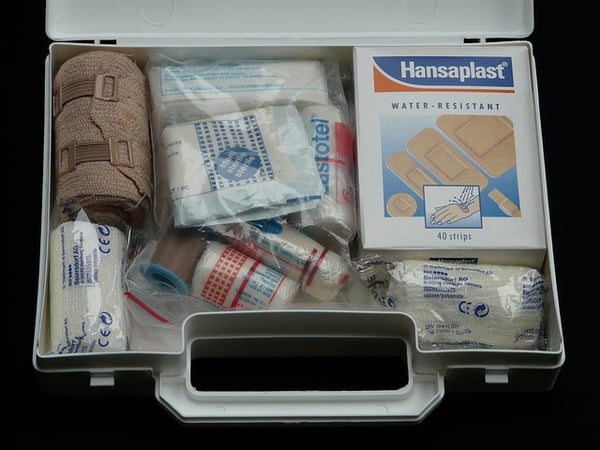First Aid
What is First Aid?
First aid is the term used for the immediate medical care provided to an individual after an injury occurs, usually at the same location where the event takes place.
First aid can be crucial in minimizing injuries and preventing disabilities or long-term effects. In extreme situations, first aid can be the difference in keeping the injured person alive.
Common examples of first aid treatment include cleaning minor scrapes, cuts, scratches, or bruises, applying bandages, drinking fluids, or providing asthmatic care, such as an inhaler.

The Importance of Administering First Aid
Injuries can occur suddenly in dynamic work site, which is why first aid is so important and a vital aspect of an emergency respo0nse plan. Companies are legally obligated to ensure that they keep first aid kits in different, easily accessible locations, and train employees on how to administer it.
There are several reasons why administering first aid is so important.
First Aid Training Saves Lives
Employees with proper first aid training are able to administer first aid more confidently and can take charge of the situation with more confidence, allowing them to act quickly.
This split-second difference could save the victim’s lives and prevent a person from long-term disability.
Relieve Pain Immediately
A severe injury often causes sharp, searing pain. Administering first aid can help relieve the pain quickly and prevent the patient from suffering even more.
The tools and equipment within a first aid kit can be used to mitigate the harmful effects. For instance, in case of a knock, an employee can use an ice pack to massage the point of impact and relieve pain.
Prevent Serious Infections or Diseases
In many cases, injuries that aren’t immediately treated can result in serious infections or diseases, which can ultimately result in debilitating long-term effects.
First aid kits include all the required materials that a person may need to treat an injury and prevent an infection. They include cleaning agents and bandages for cleaning the wound and preventing contaminants from causing an infection.
Staff with appropriate first aid training can quickly clean and treat the wound to prevent the infection from spreading until medical assistance arrives.
Improve Employee Morale and Productivity
Providing first aid kits in the workplace is mandatory and ensures legal compliance. However, it also has another effect: it improves employee morale and productivity.
Employees feel motivated when they know that management cares for their well-being and is taking steps to ensure their safety. Furthermore, first aid provisions ensure that minor injuries can be quickly treated.
First Aid Training in the Workplace
First aid training is vitally important in the workplace. Companies often bring on third-party safety officials to give presentations and provide in-depth training to employees.
However, basic principles generally involve the use of applying adhesive bandages or teaching employees how to apply pressure on bleeding wounds.
In most cases, companies leverage practical training, often using safety dummies to show how to provide first aid. Common treatment methods include administering CPR, applying bandages, or massaging techniques.
Those who receive the training are granted a certification. However, due to regular updates to first aid training methods, primarily because of updates in our clinical and medical knowledge, refresher courses are held regularly in most organizations.
Common Contents in First Aid Kits
It’s pertinent to mention that there’s universally accepted list of contents that must be included within a first aid kit. The HSE states that workplace first aid kits often contain different items depending upon the needs of the organization.
In general, common items found in first aid kits include:
- Safety pins
- Adhesive bandages
- Burn dressings
- Sterile wipes
- Antiseptic cream
- Cotton balls
- Scissors
- Face shields and masks
- Foil blankets
- Burn treatment creams
- Safety pins
- Fabric shears
As mentioned, this list isn’t exhaustive, and companies can add different items based on their risk assessment.
Reporting First Aid Injuries
Safety incident reports are critically important in modern workplaces and help improve overall safety. A first aid treatment log must be maintained by companies, especially if required legally.
In some legislations, reporting first aid injuries isn’t necessary, but because first aid injuries are an outcome of safety lapses, the company has an obligation to report them.
When preparing incident reports, companies must ensure they include important details, such as the employee’s name, how the injury occurred, date and time, the signature of the first aid provider, and a comprehensive description of the nature of treatment given.
Use EcoOnline to Manage Workplace Risks and Improve Employee Safety
EcoOnline’s Health & Safety Software makes it easy for companies to record all workplace safety incidents. It allows organizations to record any safety incidents, including reports and analyses, making it easier for them to analyse safety hazards and take appropriate steps to mitigate or eliminate them.